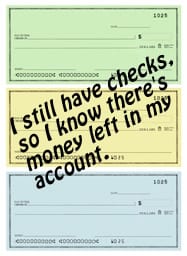 If you share a credit card account with someone else, you are either an authorized user or a joint credit card user. Knowing the difference can help protect your credit score.
If you share a credit card account with someone else, you are either an authorized user or a joint credit card user. Knowing the difference can help protect your credit score.
If you’re an authorized user, it means you can use the credit card account, but you’re NOT responsible for the payments. You have a card with your name on it, but you’re not the “card-holder.” The account won’t appear on your credit report, so it won’t help, or hurt, your credit score.
In the past, parents could add a child as an authorized user. This helped the child start his credit history, making it easier to get that first car loan or student loan. Because of some abuse, credit reporting agencies stopped monitoring authorized users. It’s now more difficult for children to begin building their credit history, but not impossible.
If you’re a joint credit card user, you and the other person were considered equally when you applied for the account. You are both responsible for the payments and the account will show up on both your credit reports. Joint card-holders should make a habit of reviewing bills and payments together to help protect you both from mistakes or fraud.








